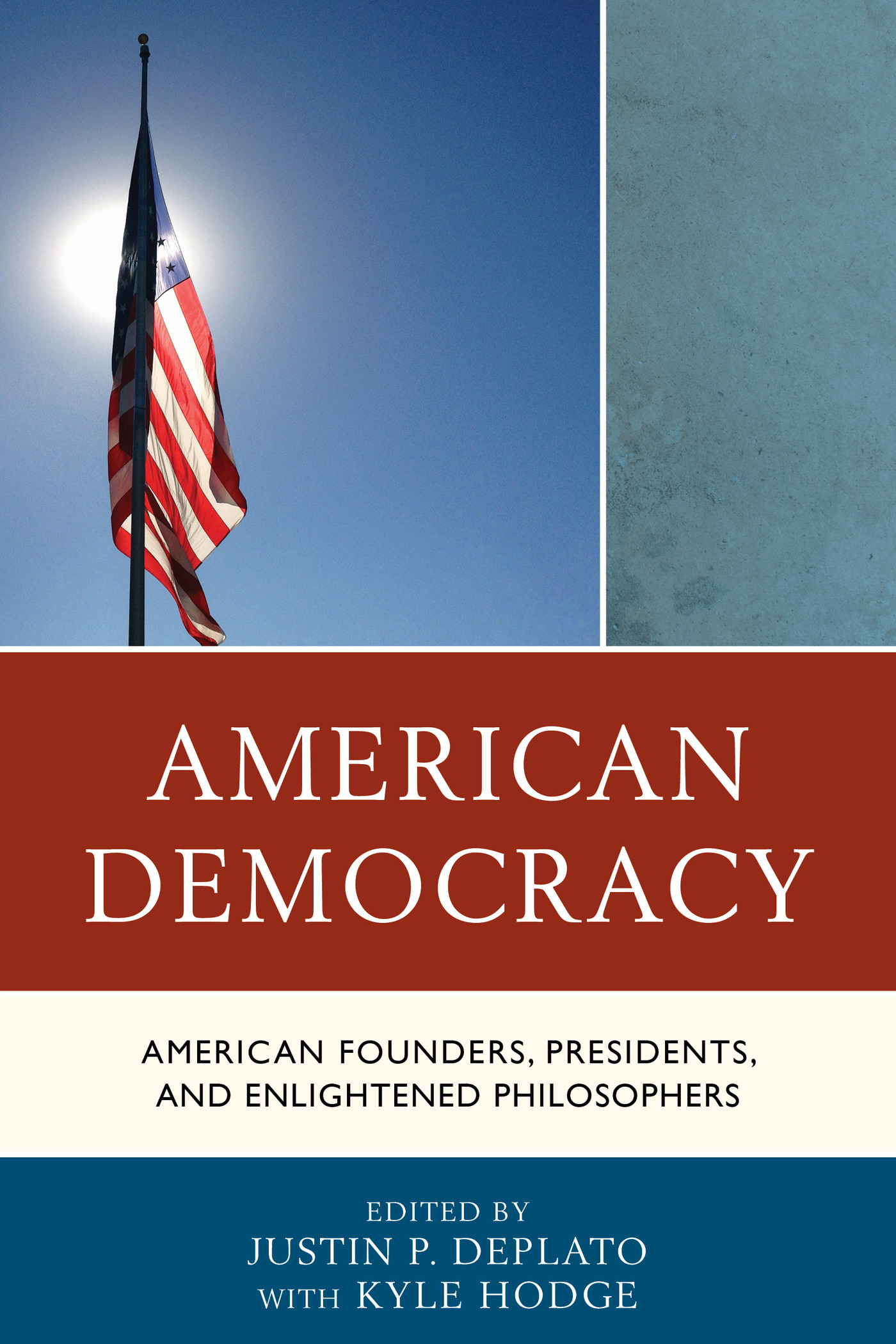American Democracy
American Democracy
American Founders, Presidents,
and Enlightened Philosophers
Edited by Justin P. DePlato
with Kyle Hodge
LEXINGTON BOOKS
Lanham Boulder New York London
Published by Lexington Books
An imprint of The Rowman & Littlefield Publishing Group, Inc.
4501 Forbes Boulevard, Suite 200, Lanham, Maryland 20706
www.rowman.com
Unit A, Whitacre Mews, 26-34 Stannary Street, London SE11 4AB
Copyright 2015 by Lexington Books
All rights reserved. No part of this book may be reproduced in any form or by any electronic or mechanical means, including information storage and retrieval systems, without written permission from the publisher, except by a reviewer who may quote passages in a review.
British Library Cataloguing in Publication Information Available
Library of Congress Cataloging-in-Publication Data
American democracy : American founders, presidents, and enlightened philosophers / edited by Justin P. DePlato ; with Kyle Hodge.
pages cm
Includes bibliographical references and index.
ISBN 978-1-4985-0322-8 (cloth : alk. paper) -- ISBN 978-1-4985-0324-2 (pbk. : alk. paper) -- ISBN 978-1-4985-0323-5 (electronic)
1. Democracy--United States--History. 2. Political science--United States--History. 3. Philosophers--United States--History. 4. Presidents--United States--History. I. DePlato, Justin P. II. Hodge, Kyle.
JK1726.A436 2015
320.973--dc23
2015027298
 TM The paper used in this publication meets the minimum requirements of American National Standard for Information Sciences Permanence of Paper for Printed Library Materials, ANSI/NISO Z39.48-1992.
TM The paper used in this publication meets the minimum requirements of American National Standard for Information Sciences Permanence of Paper for Printed Library Materials, ANSI/NISO Z39.48-1992.
Printed in the United States of America
Preface
Dr. Justin DePlato
Students tend to forget that their professors were also once students. Just like you, I was a student who sat in a classroom listening to hours and hours of lectures. Just like you, I took what seemed like thousands of pages of notes. I also suffered through the arduous process of taking the required 120 credit hours in order to obtain my bachelors degree. I, too, stressed and probably lopped several years off of my life preparing to take my exams. There is no question that obtaining knowledge, taking exams, and achieving a college degree are difficult, yet worthwhile, tasks.
As a student, I would often wonder: when am I going to use this knowledge I am acquiring? What is the purpose of reading such old texts? However, when I did read ancient political treatises, I would get very excited about them. For me, reading Plato, Aristotle, Cicero, or Locke was a true delight. I can remember thinking to myself: its about time I get to read such an important treatise! Yet, in modern times, many students are bothered by the idea of reading old texts, or, for that matter, even reading at all. It can seem as if they have come to college thinking that their job as a student is to simply sit in a classroom and occupy space.
As a professor, I cannot stress enough that your time in college is critically important to your success in life. Since you are reading this introduction, I can deduce that you are taking a course in political science, possibly focused on or involving political thinking at the founding of the United States of America. You may, or may not, be wholeheartedly interested in the topic; yet, you are in the class. Therefore, your vested interest is obvious. My advice is to get as much out of the class as you possibly can, and likewise of your entire collegiate experience.
When I was in college, I often thought to myself that having a comprehensive book which focused on theoretical reasoning for the founding of the American Republic would be a useful and very interesting text. Luckily for me, I pursued higher education further, and now I am able to write the book I always wanted to read as a student. The questions now are: what is the importance or need to learn about the founding of the American Republic? Is America that mysterious city upon a hill? Is America the proverbial beacon for the rest of the world? Do the American Republic and the principles its nation were founded on even matter?
Answering those questions is a difficult task, and many scholars will answer those questions differentlyoffering varying opinions depending on the particular prejudice or bias of the scholar. For example, scholars who believe America is a special, or blessed, nation will unequivocally answer by saying that America is an exceptional nation; however, scholars who despise the inherent hypocrisy of Americas founding will unequivocally argue that America is neither special nor blessed. Scholars will debate the question of Americas uniqueness only up until and after the fall of the Republic. As for me, I would rather not answer the question posed; rather, I will let the founders and presidents who were critical to the founding and development of the nation answer those questions for you. Ergo, this is the reason I chose to write this textbook.
Allow me to say, though, I do hope you love your nation; after all, you are living in it. Why not let the words of the American founders inspire you? Why not wrap yourself in the wisdom and patriotism of Americas founding?
I was inspired to write this book as I was giving a short lecture at Robert Morris University. While I gave my lecture, which was about the American founders, I reflected on the point that the particular university at which I was teaching bore the namesake of an American framer. Not only his name appears in locations at the university, but also many other important American framers. I then gave thought to the famous picture of American founders signing the U.S. Constitution, and thought to myself, How many students would potentially not recognize any of the men in that picture? What a shame. How did this happen? How can so many Americans know so little about the founding of their country? The answers are very complicated, but there is simply no excuse for ignorance. This book will lead you on a journey back to the founding of your country and, maybe for the first time, will educate you on why this country was founded, why the Constitution was drafted, and why these American framers fought fervently to free themselves from the English Crown.
I truly believe that history and politics are intertwined with each other like the forces of a Gemini. They are beloved twins, inseparable and composed of many of the same ingredients. Politics needs history, and history is formed from politics. As a student of politics, therefore, you must know the thinkers behind the politics of the past. In so doing, you will crack a code of political mystery, and you will be able to comprehend modern politics and behavior in ways others only opine or theorize about.
In order for you to develop and train your mind in a way to be able to read the great writings of Americas founding and development, you must prepare yourself. To help you prepare, I offer you the following short statement from the great political thinker, Niccolo Machiavelli:
When evening comes, I return to my home, and I go into my study; and on the thresh-hold, I take off my everyday clothes, which are covered in mud and mire, and I put on regal and curial robes; and dressed in a more appropriate manner I enter into the ancient courts of ancient men and am welcomed by them kindly, and there I taste the food that alone is mine, and for which I was born; and there I am not ashamed to speak to them, to ask them the reasons for their actions; and they, in their humanity, answer me; and for four hours I feel no boredom, I dismiss every affliction, I no longer fear poverty nor do I tremble at the thought of death; I become completely part of themI have noted down what I have learned from them and I have composed a little book,
Next page
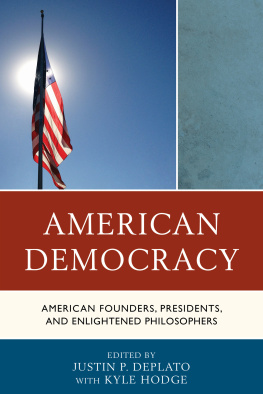
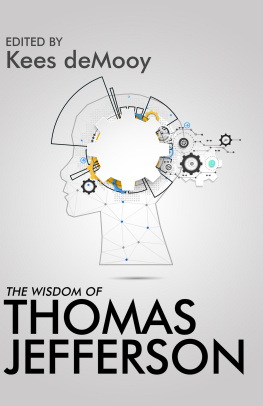
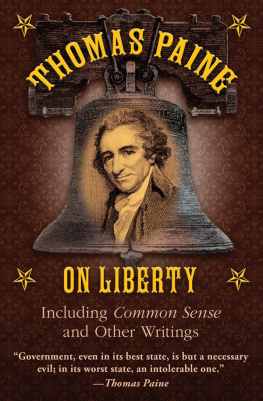

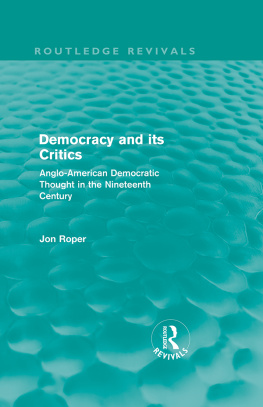
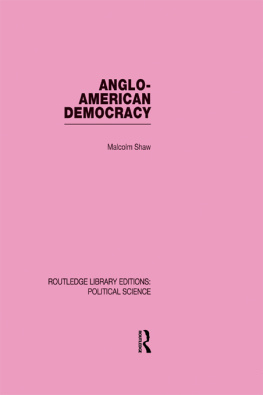
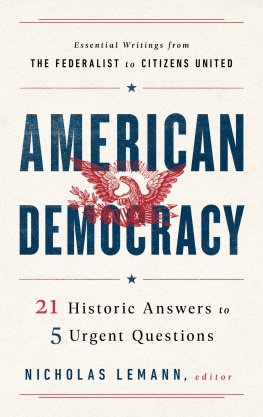
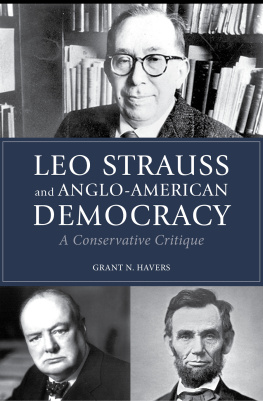
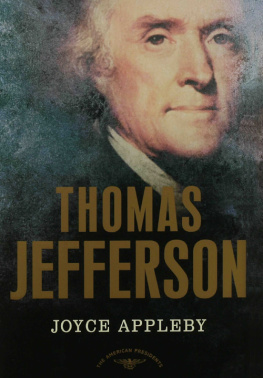

 TM The paper used in this publication meets the minimum requirements of American National Standard for Information Sciences Permanence of Paper for Printed Library Materials, ANSI/NISO Z39.48-1992.
TM The paper used in this publication meets the minimum requirements of American National Standard for Information Sciences Permanence of Paper for Printed Library Materials, ANSI/NISO Z39.48-1992.